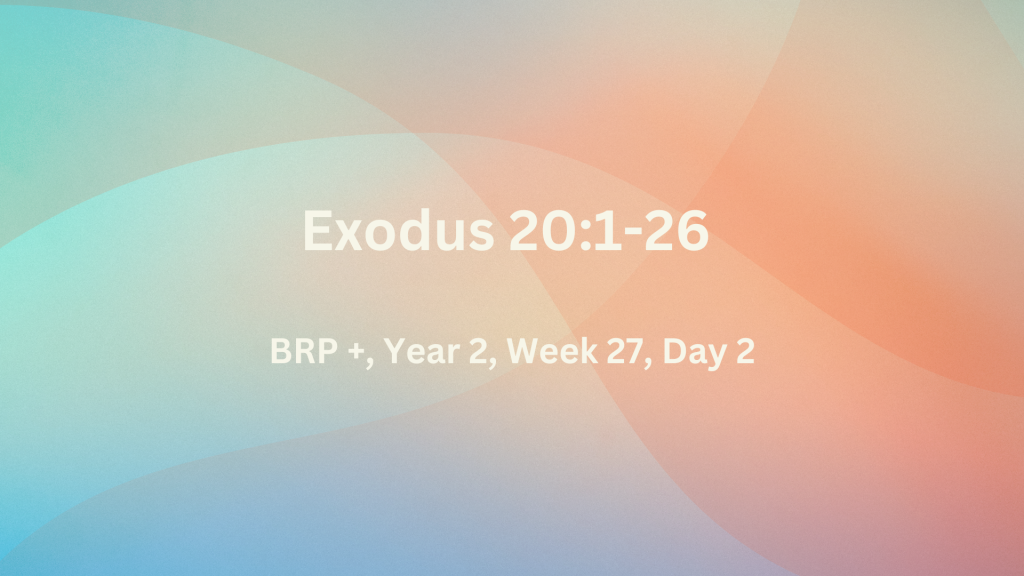Exodus 20:1-26
Q.1. On what authority did God give the Ten Commandments? What is involved in the first three commandments? What are the consequences for keeping them or breaking them? – (Exo.20:1-7)
When God called Moses on Mount Horeb to the impossible task of delivering the Hebrews out of the Egyptian Empire, He said – … When you have brought the people out of Egypt, you shall worship God on this mountain (Exo.3:12). The Ten Commandments (or Decalogue) were not adapted from other nations, but came directly from God, as He told Moses – … you (yourselves) have seen that I have spoken to you from heaven (Exo.20:22 c.f. 20:1). He had the authority to make demands on His people, since He had purchased Israel. Thus, He declared – I am the Lord your God, who brought you out of the land of Egypt, out of the house of slavery (Exo.20:2). The first three commandments addressed man’s vertical relationship with God (Exo.20:3-11). God demanded exclusive allegiance, which He underscored in the 1st commandment – You shall have no other gods before Me (Exo.20:3). In the 2nd Commandment God addressed the practices of the heathen nations of the world –4 You shall not make for yourself an idol, or any likeness of what is in heaven above or on the earth beneath or in the water under the earth. 5 You shall not worship them or serve them (Exo.20:4-5). God would not tolerate any rivals – 5 …for I the Lord your God, am a jealous God, visiting the iniquity of the fathers on the children, on the third and the fourth generations of those who hate Me, 6 but showing loving-kindness to thousands, to those who love Me and keep My commandments (Exo.20:5-6). This command reveals how far reaching on our children are the decisions we make about God, and the influence we have on our families. The 3rd Commandment warned – 7 You shall not take the name of the Lord your God in vain, for the Lord will not leave him unpunished who takes His name in vain (Exo.20:7). God understood how idolatry would infiltrate from the surrounding nations. Today people have replaced stone, wooden, and metal idols with material and technical ones. People also use God and His name as a ‘magic’ formula e.g. praying ‘in Jesus’ Name’, when it is not for His sake or glory.
Q.2. Who was expected to keep the fourth commandment? Why was the Sabbath given? What is the fifth commandment? Why is it to be obeyed? – (Exo.20:8-12)
The 4th Commandment was consistent with the pattern of creation (c.f. Gen.2:1-3). One day in seven was to be a sabbath day for rest and reflection – Remember the sabbath day, to keep it holy (Exo.20:8). All the people were to cease from their normal activities. This command included all family members, servants, and all beasts of burden (Exo.20:9-10). The Sabbath was established to remember that – … in six days, the Lord made the heavens and the earth, the sea and all that is in them, and rested on the seventh day; Therefore, the Lord blessed the sabbath day and made it holy (Exo.20:11). Christians are not commanded to keep the Sabbath or any holy day. Paul accepted that some considered one day above another. However, he treated every day as the Lord’s Day (Colossians 2:16-17, 20-23; Romans 14:5).
The remaining commandments addressed the horizontal relationships in the community. The 5th Commandment stated – Honour your father and your mother, that your days may be prolonged in the land which the Lord your God gives you (Exo.20:12). Obedience brought a promise of tenure in the Promised Land that they would possess. A breakdown in family relationships would remove God’s protection.
Q.3. What is the focus of the last five commandments? Why was the giving of the Ten Commandments so frightening? How would God’s directions for building altars prevent idolatry? – (Exo.20:13-26)
The last five commandments gave absolute standards for societal relationships: The 6th Commandment states – You shall not murder (Exo.20:13). The 7th Commandment declares – You shall not commit adultery (Exo.20:14). The 8th Commandment commands – You shall not steal (Exo.20:15). The 9th Commandment – You shall not bear false witness against your neighbour (Exo.20:16). The 10th Commandment – You shall not covet your neighbour’s house; you shall not covet your neighbour’s wife or his male servant or his female servant or his ox or his donkey or anything that belongs to your neighbour (Exo.20:17). The giving of the Decalogue was so frightening, that the people kept their distance, and asked Moses – Speak to us yourself and we will listen; but let not God speak to us, or we will die (Exo.20:19). Moses explained – Do not be afraid; for God has come in order to test you, and in order that the fear of Him may remain with you, so that you may not sin (Exo.20:20). God gave very specific instructions regarding the of building of sacrificial altars, in order to prevent idolatry (Exo.20:23). For a start, they could only be built – in every place where I cause My name to be remembered … there – I will come to you and bless you (Exo.20:24). In those places, there would be a consecrated Aaronic priesthood, to direct the offering of sacrifices, in accordance with God’s instructions. The altars were not to be ornate, so the focus would be on God alone (Exo.20:24-26). The Ten Commandments are a paradox: They reflect God’s holy character, while at the same time are a standard, to underscore our need for the Someone to save us. Though we, His people, should strive to obey, because of our Adamic & sinful nature, we will constantly fall short of the mark.

